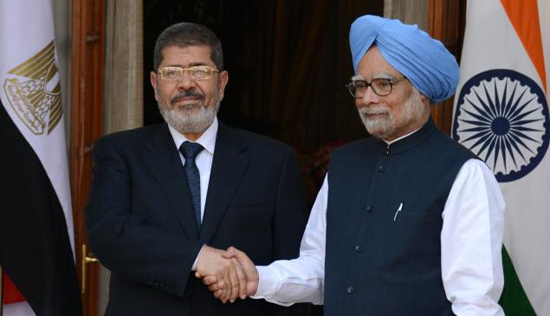
New Delhi, Mar 20: India’s Information Technology revolution is now set to reach the world’s oldest functional varsity and the highest seat of learning for Sunni Islam, Al-Azhar University in Egypt.
India and Egypt on Tuesday signed a memorandum of understanding (MoU) to set up a centre for excellence in information technology at Al-Azhar University in Cairo. The MoU was signed after a meeting between Prime Minister Manmohan Singh and Egyptian President Mohamed Morsy in New Delhi.
Morsy is on a three-day-visit to India, his first after becoming the President in June 2012, following the 2011 revolution that overthrew the Hosni Mubarak regime in Cairo.
Altogether seven pacts were signed after Singh and Morsy led the delegations of the two countries in a wide-ranging dialogue, which explored opportunities for renewing India’s ties with new Egypt. Morsy also invited India to join Egypt’s ambitious Suez Canal industrial corridor project.
The project is likely to turn the Suez Canal banks into a global economic hub. He said both New Delhi and Cairo agreed to reinforce bilateral political, economic, military and cultural relations and to take the ties to the level of strategic partnership.
Al-Azhar University, which was initially established as a madrasa in AD 970 or 972, has over the centuries emerged as one of the most important centres for study of Arabic literature and Islam. The university continues to be the world’s most prominent academic and religious institution of Sunni Islam.
India will provide human resources as well as hardware and software to set up the centre of excellence in information technology, which would provide training to 500 students of the 10th century varsity every year. The Egyptian government will provide space and logistical support to the CEIT.
“We agreed that information technology, services, electronics, small and medium enterprises, manufacturing, fertilisers and renewable energy constitute important areas of cooperation,” said Singh, addressing media persons jointly with Morsy.
India and Egypt signed another MoU for cooperation in information and communication technology, identifying the core areas to step up bilateral cooperation, like e-governance and e-education, IT and electronics hardware, sharing of experiences in the creation of Technology Parks and IT clusters, and strengthening cooperation between ICT companies in the private sector.
The two countries signed yet another MoU for exchanging information on all aspects of cyber security and supporting each other to prevent cyber attacks.
The new government of Egypt is keen on accessing India’s expertise in IT, renewable energy, services, electronics, small and medium enterprises, manufacturing and fertilizers.
Singh and Morsy discussed political transition underway in Egypt since the revolution of January 2011. The Indian prime minister expressed India’s admiration for the courage and sacrifices of the people of Egypt in ushering in a new era of democracy.
“I conveyed our full support to President Morsy and offered to share our experience, as he ably leads his nation in building strong institutions and frameworks for democracy, social justice and inclusive economic development. I am convinced that Egypt’s successful transition would be an important model for the region and the world,” said Singh.
The Antrix Cooperation Limited, the commercial wing of Indian Space Research Organisation, and the Egyptian National Authority for Remote Sensing and Space Sciences signed a letter of intent for the launch of the Egyptian Nano Satellite EGYCUBESAT-1 onboard the Polar Satellite Launch Vehicle of India.





Comments
Add new comment